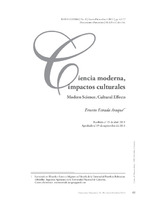| dc.contributor.author | Estrada Araque, Ernesto | |
| dc.coverage.spatial | Seccional Medellín | spa |
| dc.date.accessioned | 2021-02-05T20:06:55Z | |
| dc.date.available | 2021-02-05T20:06:55Z | |
| dc.date.issued | 2011 | |
| dc.identifier.uri | http://hdl.handle.net/20.500.11912/7901 | |
| dc.description | p. 63 - 77 | spa |
| dc.description.abstract | La cultura moderna, iniciada en el siglo XVII, transformó, no solamente el mundo, al cual idealizó en el proyecto matemático, sino que dio comienzo al proceso que dominó racionalmente todos los ámbitos culturales, sociales, económicos y morales. Se desarrolla la tesis que plantea cómo a través de la ciencia moderna se impuso la razón moderna que, al colocar la confianza en lo matemático, despejó el saber por
analogía que rigió en la Edad Medía, y especificó en el sujeto epistémico moderno la soberanía sobre el mundo, a partir de la cual se hizo posible la intervención para la modificación y para el señorío y control en cada uno de los espacios culturales: el científico, el moral y el estético. Desde la teoría crítica, se advierte también acerca del monólogo de la razón moderna, aplicada sobre los seres humanos y
sobre el mundo. | spa |
| dc.description.abstract | Modern culture, developed in the 17th century, transformed not only the world, which was idealized in its mathematical project, but started the process that dominated rationally all cultural, social, economic and moral dimensions. This paper explores how modern reason prevailed through modern science by placing our confidence in mathematical order, and thus, it overcame the knowledge through analogy which
prevailed during the Middle Ages; and granted the sovereignty over the world to modern epistemic subject, from which it became possible to intervene in order to modify and to have control in every one of the cultural dimensions: the scientific, the moral and the aesthetic. From the point of view of critical theory, this paper warns about the monologue of modern reason applied to human beings and the world. | spa |
| dc.format.mimetype | application/pdf | |
| dc.language.iso | spa | |
| dc.publisher | Universidad Pontificia Bolivariana | spa |
| dc.relation.ispartof | Pensamiento humanista | spa |
| dc.rights | Attribution-NonCommercial-NoDerivatives 4.0 International | * |
| dc.rights.uri | http://creativecommons.org/licenses/by-nc-nd/4.0/ | * |
| dc.subject | Ciencia moderna | spa |
| dc.subject | atemática | spa |
| dc.subject | Sujeto moderno | spa |
| dc.subject | Mundo moderno | spa |
| dc.subject | Cultura moderna | spa |
| dc.subject | Modern Science | spa |
| dc.subject | Mathematics | spa |
| dc.subject | Modern Subject | spa |
| dc.subject | Modern World | spa |
| dc.subject | Modern Culture | spa |
| dc.title | Ciencia moderna, impactos culturales | spa |
| dc.title.alternative | Modern Science, Cultural Effects | spa |
| dc.type | article | spa |
| dc.rights.accessRights | openAccess | spa |
| dc.type.hasVersion | publishedVersion | spa |
| dc.description.sectional | Medellín | spa |
| dc.identifier.instname | instname:Universidad Pontificia Bolivariana | spa |
| dc.identifier.reponame | reponame:Repositorio Institucional de la Universidad Pontificia Bolivariana | spa |
| dc.identifier.repourl | repourl:https://repository.unab.edu.co/ | |


